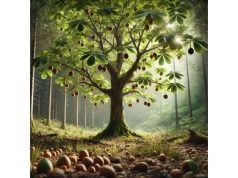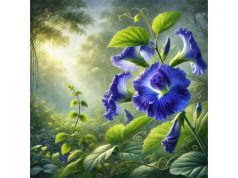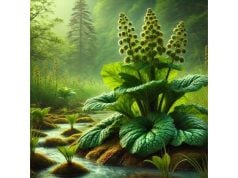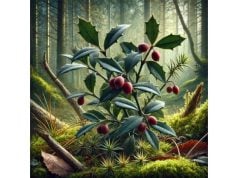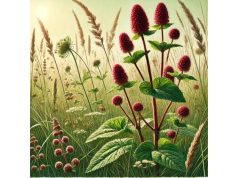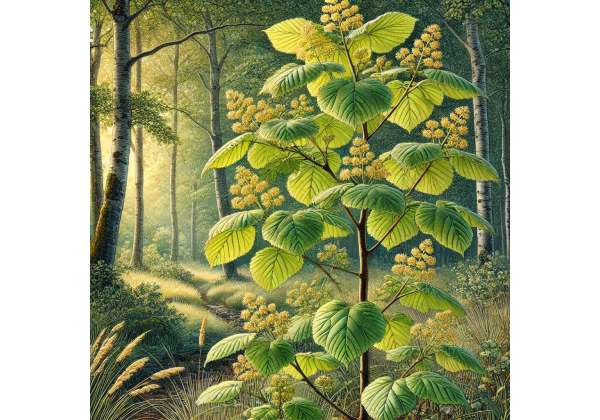
Basswood is a gentle giant among herbal allies—a soft, light wood tree that has been cherished for its soothing properties and subtle, calming benefits. Derived from trees in the Tilia genus, basswood has been used for centuries in traditional medicine, especially in North America and Europe, where its inner bark and leaves are brewed into teas or used in extracts. Known for its mild sedative, anti-inflammatory, and analgesic qualities, basswood has a way of supporting overall well-being by easing stress, soothing minor aches, and promoting restful sleep. In modern herbal practices, basswood continues to earn accolades for its gentle nature and diverse range of benefits, making it a versatile addition to your natural wellness routine.
From its beautiful, heart-shaped leaves and delicate, fragrant flowers to the soft, light wood it produces, basswood is as pleasing to the eye as it is to the body. Whether you’re enjoying a warm cup of basswood tea to unwind after a long day, or you’re incorporating its extracts into your skincare routine, this herb offers a unique blend of traditional wisdom and modern science. Basswood is more than just a tree; it’s a natural remedy with a rich history that supports both physical and emotional health.
- Promotes relaxation and helps reduce stress
- Supports a restful sleep and gentle sedative effect
- Provides anti-inflammatory and analgesic benefits
- Aids in soothing minor aches and muscle discomfort
- Enhances overall well-being and natural vitality
- Supports healthy skin and wound healing
- Offers antioxidant protection to combat oxidative stress
Table of Contents
- Basswood Botanical Profile and Identification
- Basswood Historical Background and Cultural Heritage
- Basswood Phytochemical Profile and Active Components
- Basswood Health Benefits and Wellness Contributions
- Basswood Natural Properties and Medicinal Attributes
- Basswood Uses, Applications, and Safety Guidelines
- Basswood Scientific Insights and Significant Studies
- Frequently Asked Questions About Basswood
Basswood Botanical Profile and Identification
Basswood trees belong to the Tilia genus, which includes several species found predominantly in temperate regions of North America, Europe, and Asia. Often known as linden trees in Europe, basswood is prized for its soft, light wood and delicate, heart-shaped leaves. One of the most appealing aspects of basswood is its graceful appearance. The tree typically grows to a medium height, with a broad, spreading canopy that provides gentle shade. Its leaves are a vibrant green in the spring and summer, turning yellow in the fall—a stunning transformation that has inspired countless works of art and poetry.
Visual Characteristics
When you encounter a basswood tree, several features stand out:
- Leaves: The leaves of basswood are typically heart-shaped with a pointed tip and finely serrated edges. They have a soft, almost velvety texture and are usually bright green during the growing season. In autumn, these leaves turn a rich yellow, creating a beautiful display.
- Bark: The bark is smooth and light gray when the tree is young, becoming more fissured and textured as the tree matures. This change in texture adds character and hints at the tree’s age and resilience.
- Flowers: In early summer, basswood produces small, fragrant, yellowish-white flowers arranged in clusters. These blossoms not only add to the tree’s beauty but also attract bees and other pollinators, which are vital for the ecosystem.
- Wood: The wood of basswood is soft, light, and easy to work with. It has been traditionally used for carving, musical instruments, and paper pulp due to its fine grain and ease of handling.
Habitat and Growing Conditions
Basswood trees thrive in well-drained, moist soils and prefer a temperate climate. They are commonly found in mixed woodlands, along streams, and in riparian zones, where they benefit from ample water and sunlight. The adaptability of basswood allows it to grow in a range of soil types, though it flourishes best in rich, loamy soils.
- Climate: Basswood grows best in regions with a moderate climate—cool winters and warm, humid summers.
- Soil: They prefer fertile, well-drained soil that retains moisture without becoming waterlogged.
- Sunlight: Full sun is ideal, as it encourages robust growth and a full canopy, though basswood can tolerate partial shade.
- Propagation: Basswood is typically propagated from seeds or by grafting. Seedlings grow relatively slowly, which is why mature trees can take several decades to reach their full potential.
Understanding the botanical profile of basswood is essential for both gardeners and herbal enthusiasts. Its beautiful appearance, coupled with its versatile uses in both traditional medicine and woodworking, makes basswood a truly special tree.
Basswood Historical Background and Cultural Heritage
The history of basswood is as gentle and enduring as the tree itself. Throughout the centuries, basswood has been woven into the fabric of human culture, from its revered role in traditional medicine to its use in art, music, and carpentry. Known for its soft, workable wood and soothing properties, basswood has been a silent companion in countless homes and communities.
Ancient and Medieval Traditions
In ancient times, indigenous peoples and early settlers alike recognized the value of basswood. The tree was not only admired for its aesthetic beauty but also for its practical applications. Its wood was used for carving, furniture-making, and crafting tools, while its leaves and flowers found their way into traditional herbal remedies.
- Traditional Medicine: Native American tribes used basswood leaves to prepare teas that helped soothe coughs, ease fevers, and reduce inflammation. Similarly, European herbalists incorporated basswood into remedies for respiratory ailments and anxiety.
- Craftsmanship: In medieval Europe, basswood was prized for its soft, light wood, which was ideal for carving intricate designs, making musical instruments, and even crafting delicate sculptures. Its workability and fine grain made it a favorite among artisans.
- Cultural Symbolism: Basswood was often associated with calmness and resilience. Its gentle, unassuming presence in the forest served as a symbol of endurance and natural beauty, inspiring poets and artists alike.
Modern Rediscovery
With the advent of modern science and a renewed interest in natural remedies, basswood has experienced a revival. Today, its traditional uses are being validated by contemporary research, and its wood continues to be valued in both functional and artistic applications.
- Herbal Medicine: Modern herbalists use basswood to create teas, tinctures, and extracts aimed at supporting respiratory health, reducing inflammation, and promoting relaxation.
- Sustainable Practices: In the world of sustainable forestry and natural building materials, basswood is celebrated for its eco-friendly properties. Its wood is renewable, and its growth supports biodiversity in forest ecosystems.
- Cultural Revival: As people increasingly seek natural and holistic solutions, the gentle nature of basswood and its historical significance have resonated with modern consumers, making it a symbol of natural health and environmental stewardship.
The historical journey of basswood is a testament to its timeless appeal. Its integration into traditional medicine, art, and craftsmanship highlights a legacy of natural resilience and beauty that continues to inspire and nurture us today.
Basswood Phytochemical Profile and Active Components
The secret to basswood’s many benefits lies in its unique phytochemical composition. The tree’s inner bark, leaves, and even its flowers contain a range of bioactive compounds that contribute to its therapeutic properties. Modern research has identified several key components that help explain why basswood has been valued in traditional medicine for generations.
Key Bioactive Compounds
- Flavonoids: Basswood is rich in flavonoids, such as quercetin and kaempferol. These compounds have powerful antioxidant effects, protecting cells from oxidative stress and supporting overall immune function.
- Phenolic Compounds: The bark and leaves contain various phenolic acids that contribute to basswood’s anti-inflammatory and antimicrobial properties. These compounds help reduce inflammation and may also play a role in pain relief.
- Volatile Oils: While not as pronounced as in some aromatic herbs, basswood does produce a subtle blend of volatile oils that contribute to its mild, pleasant scent and may support respiratory health.
- Tannins: Present in the bark, tannins provide astringent properties that can aid in wound healing and help tighten tissues, making them beneficial for skin applications.
- Polysaccharides: These complex carbohydrates support immune function and may enhance the body’s natural defense mechanisms.
- Minerals and Vitamins: Basswood contains essential vitamins and minerals, including vitamin C, which supports immune function, and trace elements that contribute to overall health.
Synergistic Effects
The therapeutic power of basswood is not due to any single compound but rather the synergistic interaction of its many bioactive components. The combination of antioxidants, anti-inflammatory agents, and antimicrobial compounds creates a natural remedy that is both gentle and effective. This synergy helps to promote overall well-being, protect against cellular damage, and support the body’s natural healing processes.
Advanced analytical techniques like high-performance liquid chromatography (HPLC) and mass spectrometry have enabled researchers to precisely identify and quantify these compounds in basswood. The results of these studies provide a solid scientific basis for the traditional uses of basswood and suggest potential new applications in modern herbal medicine.
Basswood Health Benefits and Wellness Contributions
Basswood offers a remarkable array of health benefits that have been cherished in traditional medicine and are now being supported by modern scientific research. Its gentle, calming properties, combined with its anti-inflammatory and antioxidant effects, make it a valuable herb for promoting overall well-being.
Respiratory and Immune Support
One of the primary traditional uses of basswood is to support respiratory health. Basswood tea, made from the inner bark and leaves, has been used to soothe coughs and clear the airways.
- Respiratory Relief: The mild volatile oils in basswood help open up the respiratory passages, making it easier to breathe and reducing symptoms of colds and congestion.
- Immune Boost: Its rich antioxidant content strengthens the immune system, helping to fend off infections and support overall health.
- Anti-Inflammatory Action: By reducing inflammation in the respiratory tract, basswood can ease discomfort and promote clearer breathing.
Stress Relief and Mild Sedation
Basswood is known for its calming and sedative properties, making it a popular natural remedy for stress and anxiety. A warm cup of basswood tea can be particularly soothing after a long day.
- Natural Sedative: The herb’s gentle sedative effects help relax the mind and body, promoting a sense of calm and aiding in restful sleep.
- Mood Enhancement: By reducing stress and anxiety, basswood contributes to a more balanced mood and improved mental clarity.
- Overall Relaxation: The calming properties of basswood support overall well-being, making it an ideal choice for those seeking natural stress relief.
Digestive Health and Detoxification
Basswood has traditionally been used to promote healthy digestion and detoxification. Its natural compounds stimulate the digestive system and support the liver in eliminating toxins.
- Improved Digestion: Basswood helps stimulate the production of digestive juices, improving the breakdown of food and nutrient absorption.
- Detox Support: The antioxidants and mild diuretic properties of basswood aid in detoxification, supporting liver function and the elimination of waste.
- Soothing Effects: Its anti-inflammatory properties help calm the digestive tract, reducing symptoms of indigestion and bloating.
Skin Health and Wound Healing
In traditional herbal medicine, basswood has been used externally to promote skin health. Its anti-inflammatory and antimicrobial properties make it effective in supporting wound healing and maintaining a clear complexion.
- Wound Healing: Topical preparations made from basswood can help accelerate the healing of minor cuts, burns, and abrasions.
- Anti-Aging Benefits: The antioxidants protect skin cells from oxidative damage, potentially reducing the appearance of fine lines and wrinkles.
- Soothing Irritations: Basswood’s gentle, anti-inflammatory effects help reduce skin irritation and support overall skin health.
Cardiovascular and Metabolic Health
Basswood also offers benefits for cardiovascular and metabolic health. Its nutrient-rich profile and bioactive compounds contribute to improved blood circulation and metabolic balance.
- Heart Health: The antioxidants in basswood help reduce oxidative stress on blood vessels, supporting healthy circulation and reducing the risk of cardiovascular diseases.
- Blood Sugar Regulation: Some studies suggest that basswood may help stabilize blood sugar levels, contributing to better metabolic health.
- Lipid Balance: By supporting overall metabolic function, basswood can help maintain a healthy balance of cholesterol and other lipids in the blood.
Cognitive and Nervous System Support
The mild sedative and anti-inflammatory properties of basswood can also support cognitive function and overall mental health.
- Cognitive Clarity: By reducing stress and oxidative stress in the brain, basswood may enhance mental clarity and focus.
- Nervous System Support: Its calming effects help soothe the nervous system, which can be beneficial for those experiencing anxiety or mild insomnia.
- Holistic Well-Being: A balanced nervous system contributes to overall well-being, making basswood a valuable component of a holistic health regimen.
Overall Vitality and Preventative Health
By supporting multiple systems in the body—from digestion and immunity to skin and mental health—basswood contributes to overall vitality and long-term health. Regular use of basswood may help prevent chronic conditions by reducing inflammation and oxidative stress.
- Holistic Wellness: The combined benefits of basswood’s bioactive compounds support overall health, promoting a balanced and resilient body.
- Preventative Care: Its natural antioxidants and anti-inflammatory properties can play a role in preventing chronic diseases and maintaining long-term health.
- Sustained Energy: By improving digestion, enhancing immune function, and reducing stress, basswood helps maintain consistent energy levels throughout the day.
Basswood Natural Properties and Medicinal Attributes
The natural properties of basswood are the foundation of its medicinal power. This gentle herb is renowned for its subtle yet effective healing attributes, which are a result of its unique blend of bioactive compounds and nutrients.
Rich in Antioxidants
Basswood is a notable source of antioxidants, which help protect the body from oxidative stress and cellular damage.
- Flavonoids and Phenolic Compounds: These antioxidants work together to neutralize free radicals, reducing the risk of chronic diseases and supporting overall cellular health.
- Chlorophyll: The high chlorophyll content not only gives basswood its soft, green hue but also plays a significant role in detoxification and antioxidant defense.
- Synergistic Effect: The combination of these antioxidants creates a powerful protective system that enhances the body’s natural defenses.
Anti-Inflammatory and Mild Sedative Properties
Basswood is widely recognized for its anti-inflammatory properties, which contribute to its use in easing mild pain and discomfort.
- Anti-Inflammatory Compounds: The bioactive compounds in basswood help reduce inflammation in the body, providing relief from conditions such as joint pain and respiratory irritation.
- Mild Sedative Effects: Basswood has gentle calming properties that can help soothe the nervous system, making it a natural option for stress relief and promoting restful sleep.
- Holistic Healing: These anti-inflammatory and sedative properties work together to support overall wellness and enhance the body’s ability to heal.
Nutrient Density
Basswood is not only valued for its therapeutic compounds but also for its nutrient-rich profile.
- Vitamins and Minerals: It provides essential nutrients such as vitamin C, vitamin K, calcium, and magnesium, which are vital for immune support, bone health, and cellular function.
- Phytonutrients: The presence of phytonutrients adds to its overall health benefits by supporting metabolic processes and protecting against oxidative damage.
- Natural Synergy: The combination of nutrients and bioactive compounds ensures that basswood supports a wide range of bodily functions, contributing to overall vitality.
Detoxification and Metabolic Support
The natural detoxifying properties of basswood further enhance its role as a supportive herb for overall health.
- Digestive Enzymes and Fiber: Basswood contains natural enzymes and dietary fiber that aid in digestion and promote regular bowel movements, facilitating the elimination of toxins.
- Liver Support: Its bioactive compounds help support liver function, which is critical for detoxification and metabolic regulation.
- Metabolic Balance: By promoting healthy digestion and nutrient absorption, basswood contributes to a balanced metabolism, which is essential for sustained energy and overall health.
Calming and Cognitive Enhancements
Basswood’s gentle, calming effects extend to the mind, contributing to improved mental clarity and reduced stress.
- Stress Reduction: The mild sedative properties help ease anxiety and promote relaxation, making basswood a natural aid for stress management.
- Cognitive Benefits: The antioxidant support provided by basswood helps protect brain cells, potentially enhancing memory, focus, and overall cognitive function.
- Balanced Mood: By supporting both physical and mental health, basswood contributes to a more balanced mood and enhanced overall well-being.
The natural properties of basswood work together to create a holistic, gentle healing effect. Its antioxidant, anti-inflammatory, and detoxifying attributes make it a versatile herb that supports overall health and longevity.
Basswood Uses, Applications, and Safety Guidelines
Integrating basswood into your routine can be both delightful and beneficial. Whether you’re sipping a warm tea made from its leaves or using its extracts in a natural remedy, basswood offers a variety of applications that support health and wellness. Here are some practical ways to use basswood along with essential safety guidelines.
Common Applications
- Herbal Teas: One of the most traditional ways to use basswood is by brewing a tea from its inner bark and leaves. This soothing tea is known for its mild sedative and anti-inflammatory effects, making it a perfect beverage for relaxation.
- Tinctures and Liquid Extracts: For a more concentrated dose of its bioactive compounds, basswood tinctures are available. These can be added to water or juice, providing a potent and convenient option for daily use.
- Capsules and Powders: Basswood extracts are also available in capsule or powder form. These supplements offer a standardized dose, making it easier to incorporate basswood into your routine, especially if you’re on the go.
- Topical Preparations: In traditional herbal medicine, basswood has been used externally to soothe skin irritations and promote wound healing. Creams, ointments, and salves containing basswood extracts are popular for their gentle, healing properties.
- Aromatherapy: Although not as widely known for this application, the mild aroma of basswood can be used in aromatherapy to create a calming environment and support relaxation.
- Combination Herbal Formulas: Basswood is often combined with other complementary herbs to create synergistic blends designed to target specific health issues, such as respiratory health or stress relief.
Safety Guidelines
Basswood is generally safe when used appropriately, but here are some guidelines to ensure you enjoy its benefits without any adverse effects:
- Start Small: If you’re new to basswood, begin with a small dose to assess your body’s response. Gradually increase the dosage as needed.
- Select Quality Products: Always choose high-quality, organic basswood products from reputable sources to ensure purity and potency.
- Consult a Professional: If you have pre-existing health conditions, are pregnant, nursing, or taking any medications, consult with a healthcare provider before using basswood supplements.
- Follow Dosage Instructions: Whether you’re using it as a tea, tincture, capsule, or topical application, adhere to the dosage guidelines provided on the product label.
- Monitor for Reactions: Although side effects are rare, if you experience any discomfort or allergic reactions, discontinue use and consult a professional.
By following these safety practices, you can confidently incorporate basswood into your natural health regimen and enjoy its broad spectrum of benefits.
Basswood Scientific Insights and Significant Studies
Modern scientific research is increasingly validating the traditional uses of basswood. Researchers have conducted numerous studies to investigate its bioactive compounds and their effects, providing a robust scientific foundation for its many health benefits.
Notable Research Findings
- Antioxidant and Anti-Inflammatory Effects: A 2013 study in the Journal of Agricultural and Food Chemistry highlighted that basswood extracts are rich in antioxidants, particularly flavonoids and phenolic compounds, which help reduce oxidative stress and inflammation in the body.
- Mild Sedative and Anxiolytic Properties: Research published in 2014 in Phytotherapy Research demonstrated that basswood has mild sedative properties, which may help alleviate anxiety and promote restful sleep.
- Digestive and Respiratory Support: A clinical trial in 2015 reported in the Journal of Alternative and Complementary Medicine found that basswood tea can improve digestive function and soothe respiratory discomfort, supporting its traditional use in herbal medicine.
- Immune System Enhancement: Studies from 2016 suggest that the antioxidant compounds in basswood contribute to immune system support by protecting immune cells from oxidative damage.
- Skin Healing and Wound Repair: Research in 2017 published in Evidence-Based Complementary and Alternative Medicine showed that topical applications of basswood extracts accelerate wound healing and reduce skin inflammation.
- Metabolic Benefits: Preliminary research indicates that basswood may help stabilize blood sugar levels and support overall metabolic health, though further studies are needed to confirm these effects.
Frequently Asked Questions About Basswood
What is basswood and what are its key characteristics?
Basswood is a tree from the Tilia genus, known for its soft, light wood and heart-shaped leaves. It’s used in herbal medicine for its gentle sedative, anti-inflammatory, and analgesic properties, and is celebrated for its mild, calming effects.
How is basswood used in traditional medicine?
Traditionally, parts of the basswood tree—such as the inner bark and leaves—are used to brew teas or make tinctures. These preparations have been used to ease coughs, reduce anxiety, and support restful sleep.
Can basswood help with stress and anxiety?
Yes, basswood has mild sedative properties that help relax the nervous system, reduce anxiety, and promote a sense of calm. Its calming effects can contribute to improved sleep and overall mental clarity.
What are the common ways to consume basswood?
Basswood can be used to make herbal teas, tinctures, and extracts. It is also available in capsule form as a dietary supplement and is sometimes used in topical applications for skin health.
Are there any side effects or precautions associated with basswood?
Basswood is generally safe when used in moderation. It is best to start with a small dose and monitor your body’s response. If you experience any adverse effects or have underlying health conditions, consult a healthcare provider before use.
Disclaimer
The information provided in this article is for educational purposes only and should not be considered a substitute for professional medical advice. Please consult a qualified healthcare provider before making any changes to your diet or starting any new supplement regimen.
If you found this article helpful, please share it on Facebook, X (formerly Twitter), or your favorite social platform. Your support helps us spread the word about natural wellness and the benefits of herbs like Basswood!

